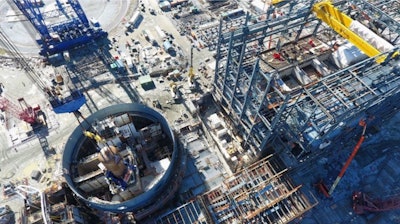
COLUMBIA, S.C. (AP) — The private utility that spent billions of dollars on the construction of two nuclear reactors in South Carolina which were abandoned without generating any power said government watchdogs should bear much of the responsibility for the debacle.
A lawyer for South Carolina Electric & Gas made a rare public statement for the company Thursday during opening statements in what's likely to be weeks of hearings before the Public Service Commission.
The Office of Regulatory Staff has already said executives of SCE&G and its parent company SCANA Corp. lied about problems and cost overruns on the two reactors it was trying to build at the V.C. Summer plant.
They also said the same state law that allowed SCE&G to raise rates nine times to pay for the plant before it was finished also tied its hands, forcing agency employees to care more about the concerns of the utilities than customers.
The hearings before regulators have high stakes for SCE&G. The seven Public Service Commission members are trying to set electric rates. Environmental and consumer groups and many lawmakers want all or most of the $2 billion paid to the utility for the failed plants to be returned. That would knock up to $27 off the average monthly bill.
SCE&G said that would cause the utility to go bankrupt.
The hearing will include weeks of complex testimony. Fourteen different entities, from a customer, to a lawyer for the Legislature, the Department of Defense, the state Attorney General's Office and the state's electric cooperatives all gave opening statements.
Attorney David Balser started his opening statement apologizing to customers on SCE&G's behalf. He then said the company has unfairly shouldered all the blame.
SCE&G would still be plugging away on the reactors if it wasn't for the bankruptcy of Westinghouse, which was the contractor building the reactors, and the decision in the summer of 2017 by state-owned utility Santee Cooper with its 45 percent share in the project to give up.
"Success has many fathers, but failure is an orphan," Balser said.
Earlier in the day, attorney Robert Guild, working for the Sierra Club, said SCE&G willful mismanagement of the project was like killing someone, and its demands that rates not be significantly reduced was a stick-up meant to benefit shareholders and executives.
"It's as if we've been confronted by a murder, followed by an armed robbery," Guild said.
An important sidebar to the rate argument is what happens to SCANA. Dominion Energy from Virginia has made a bid to take over the company, by offering two plans — either give customers a rebate of up to $1,000 with a smaller rate cut or no refund and a slightly bigger rate cut. Dominion will withdraw the merger if the rate increases are rolled back as far as the Office of Regulatory Staff wants, utility attorney Joe Reed said.
"The ORS is going for broke here, and they may end up with just that — a broken utility," Reed said.
SCE&G customer William Dowdy told commissioners he didn't have all the answers, but he asked them to be skeptical of everyone, especially companies and utilities that promise a lot.
He cited Dominion's ads touting the refund. They say "that's a lot of groceries," Dowdy said. "No, that's a lot of baloney."






















